
Call of Cthulhu is a horror fiction role-playing game based on H. P. Lovecraft's story of the same name and the associated Cthulhu Mythos. The game, often abbreviated as CoC, is published by Chaosium; it was first released in 1981 and is in its seventh edition, with licensed foreign language editions available as well. Its game system is based on Chaosium's Basic Role-Playing (BRP) with additions for the horror genre. These include special rules for sanity and luck.
Open gaming is a movement within the tabletop role-playing game (RPG) industry with superficial similarities to the open source software movement. The key aspect is that copyright holders license their works under public copyright licenses that permit others to make copies or create derivative works of the game.
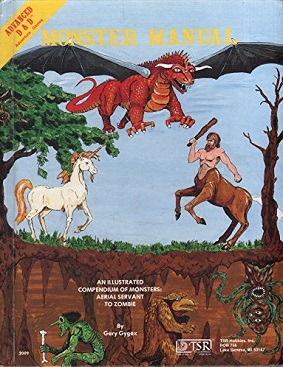
The Monster Manual is the primary bestiary sourcebook for monsters in the Dungeons & Dragons fantasy role-playing game, first published in 1977 by TSR. The Monster Manual was the first hardcover D&D book and includes monsters derived from mythology and folklore, as well as creatures created specifically for D&D. Creature descriptions include game-specific statistics, a brief description of its habits and habitats, and typically an image of the creature. Along with the Player's Handbook and Dungeon Master's Guide, the Monster Manual is one of the three "core rulebooks" in most editions of the D&D game. As such, new editions of the Monster Manual have been released for each edition of D&D. Due to the level of detail and illustration included in the 1977 release, the book was cited as a pivotal example of a new style of wargame books. Future editions would draw on various sources and act as a compendium of published monsters.
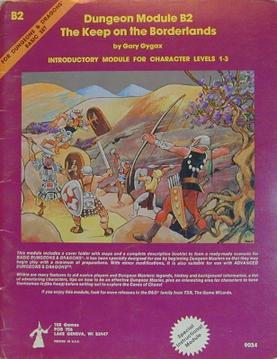
The Keep on the Borderlands is a Dungeons & Dragons adventure module by Gary Gygax, first printed in December 1979. In it, player characters are based at a keep and investigate a nearby series of caves that are filled with a variety of monsters. It was designed to be used with the Dungeons & Dragons Basic Set, and was included in the 1979–1982 editions of the Basic Set. It was designed for people new to Dungeons & Dragons.

An owlbear is a fictional creature originally created for the Dungeons & Dragons fantasy role-playing game. An owlbear is depicted as a cross between a bear and an owl, which "hugs" like a bear and attacks with its beak. Inspired by a plastic toy made in Hong Kong, Gary Gygax created the owlbear and introduced the creature to the game in the 1975 Greyhawk supplement; the creature has since appeared in every subsequent edition of the game. Owlbears, or similar beasts, also appear in several other fantasy role-playing games, video games and other media.
Several different editions of the Dungeons & Dragons (D&D) fantasy role-playing game have been produced since 1974. The current publisher of D&D, Wizards of the Coast, produces new materials only for the most current edition of the game. However, many D&D fans continue to play older versions of the game and some third-party companies continue to publish materials compatible with these older editions.
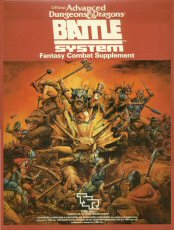
Battlesystem is a tabletop miniature wargame designed as a supplement for use with the Dungeons & Dragons role-playing game. The original Battlesystem was printed as a boxed set in 1985 for use with the first edition AD&D rules. For the second edition of AD&D, a new version of Battesystem was printed as a softcover book in 1989.

The history of role-playing games begins with an earlier tradition of role-playing, which combined with the rulesets of fantasy wargames in the 1970s to give rise to the modern role-playing game. A role-playing game (RPG) is a type of game in which the participants assume the roles of characters and collaboratively create stories. Traditionally all the participants but one take on characters and determine the actions of their characters based on their characterization and the actions succeed or fail according to a system of rules and guidelines, and one of the participants takes on the role of game master who narrates the story, plays all the non-player characters and determine the challenge rating and the outcome of various actions. Within the rules, the participants may improvise freely; their choices shape the direction and outcome of the games.
James Daniel Lowder is an American author, anthologist, and editor, working regularly within the fantasy, dark fantasy, and horror genres, and on tabletop role-playing games and critical works exploring popular culture.

Goodman Games is an American game publisher best known for the Dungeon Crawl Classics series of adventure modules and role-playing game, its science fiction offshoot Mutant Crawl Classics, and Original Adventures Reincarnated, a line of updated, annotated, and expanded republications of classic RPG adventures and supplements, mostly from TSR, Inc.'s Advanced Dungeons & Dragons. Additionally, Goodman Games produces RPGs using versions of the DCC rules for Fritz Leiber's Lankhmar and Jack Vance's Dying Earth settings, under license. The company has also produced licensed adventures for Wicked Fantasy Factory, Judges Guild, Xcrawl, Iron Heroes, Castles and Crusades, and Death Dealer.
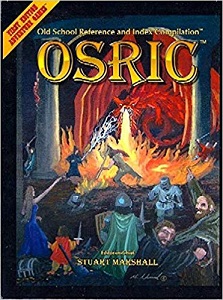
OSRIC, short for Old School Reference and Index Compilation, is a fantasy role-playing game system. It is a remake of the first edition of Advanced Dungeons & Dragons (AD&D), and one of the most successful Dungeons & Dragons retro-clones. OSRIC describes itself as "a compilation of rules for old school-style fantasy gaming...intended to reproduce underlying rules used in the late 1970s to early 1980s". OSRIC uses the Open Gaming License and the System Reference Document of Dungeons & Dragons 3rd edition to create a new presentation of the first edition rule set.
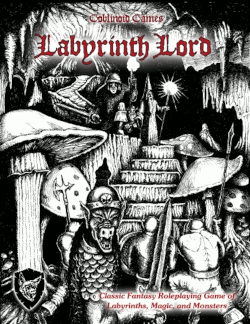
Labyrinth Lord (LL) is a fantasy role-playing game written and edited by Daniel Proctor and published by Goblinoid Games. It emulates the rules and feel of Dungeons & Dragons (D&D) using the Open Game License (OGL) from Wizards of the Coast. LL is based on the 1981 D&D Basic Set edited by Tom Moldvay and its accompanying Expert Set by David "Zeb" Cook.

The Pathfinder Roleplaying Game is a fantasy role-playing game (RPG) that was published in 2009 by Paizo Publishing. The first edition extends and modifies the System Reference Document (SRD) based on the revised 3rd edition Dungeons & Dragons (D&D) published by Wizards of the Coast under the Open Game License (OGL) and is intended to be backward-compatible with that edition.

The Dungeons & Dragons Basic Set is a set of rulebooks for the Dungeons & Dragons (D&D) fantasy role-playing game. First published in 1977, it saw a handful of revisions and reprintings. The first edition was written by J. Eric Holmes based on Gary Gygax and Dave Arneson's original work. Later editions were edited by Tom Moldvay, Frank Mentzer, Troy Denning, and Doug Stewart.
Wayfarers is a pencil and paper role-playing game (RPG) released in the fall of 2008 by the Ye Olde Gaming Companye (YOGC). It was created by Jimmy T. Swill and Gregory Vrill. The names Jimmy Swill and Gregory Vrill are used within the book as names for example characters.

The Expert Set is an expansion boxed set for the Dungeons & Dragons fantasy role-playing game. It was first published in 1981 as an expansion to the Basic Set.
The Old School Renaissance, Old School Revival, or OSR, is a play style movement in tabletop role-playing games which draws inspiration from the earliest days of tabletop RPGs in the 1970s, especially Dungeons & Dragons. It consists of a loose network or community of gamers and game designers who share an interest in a certain style of play and set of game design principles.

Basic Fantasy Role-Playing Game, is an open source retro-clone role-playing game written by Chris Gonnerman that emulates, and is largely compatible with, the 1981 Basic and Expert sets of Dungeons & Dragons. Its main differences from B/X D&D include d20-style ascending armor class and separation of character race and class. It was first published in print in 2007 and updated in 2008, 2014, and 2023. The game is one of the first products of the Old School Revival and has been positively received.
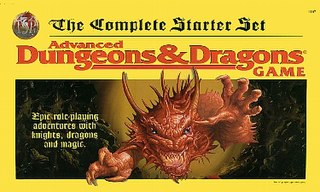
The Dungeons & Dragons Starter Set is a category of companion accessories across multiple editions of the Dungeons & Dragons fantasy role-playing game. In general, the Starter Set is a boxed set that includes a set of instructions for basic play, a low level adventure module, pre-generated characters, and other tools to help new players get started.
Matthew J. Finch is a writer, game designer, and artist.












